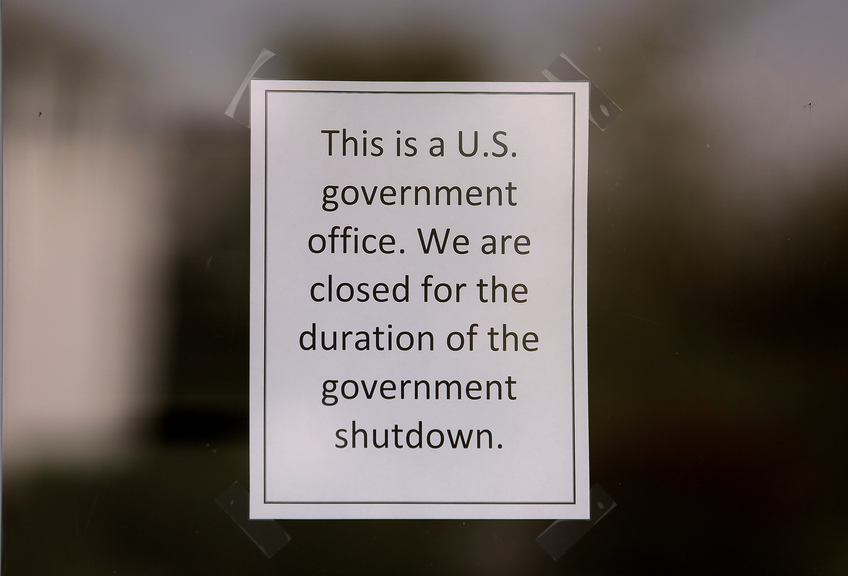Stephanie Simpson of Sanford lost several days of work this summer at the Naval Branch Health Clinic in Portsmouth, N.H., because of federal spending cuts that took effect in March. Now, she’s furloughed from her job as an audiologist because of the government shutdown that started Tuesday.
Simpson’s husband, Richard, works at the Portsmouth Naval Shipyard in Kittery as a network engineer. He, too, was sent home on furlough Tuesday, but was called back to his job Wednesday – without pay.
The government shutdown has affected a widespread and diverse workforce, sending home thousands of workers throughout Maine and forcing others to work without knowing when, or if, they will get paid.
Down East in Cutler, workers at the Naval Computer and Telecommunications Station were sent home, while in Bangor and Portland, air traffic controllers are working without pay. In Augusta, workers who process veterans benefits are expected to be sent home within days.
“We work closely with these workers and thousands more who are worried that they will not be able to pay their bills,” said Sarah Bigney, spokeswoman for the Maine AFL-CIO. “Many are living paycheck to paycheck.”
Simpson, 28, has spent this week monitoring the news out of Washington and crunching numbers for her family budget. If she isn’t called back to work on Monday, the family will have to dip into savings.
“We have money in savings to fall back on, but it’s frustrating to have to use that because our government can’t get its crap together,” Simpson said. “We don’t live beyond our means and we have some savings, but we had other plans for our savings – such as renovating the house.”
To save money, Simpson took her daughter out of day care this week. She said, “Eventually, the savings will run out. It’s scary not knowing what’s going to happen. I don’t think it’s really sunk in completely.”
Simpson said she has used her furlough days wisely by researching ways to go back to school and then change jobs.
“I’m thinking that a federal job is not quite as safe as I once thought it would be,” she said.
Simpson isn’t alone in struggling with uncertainty and financial stress, with the shutdown poised to drag into its second week.
When Dave Knowles, 55, was furloughed from his job as a safety inspector for the Federal Aviation Administration, his wife picked up extra nursing shifts at Maine Medical Center in Portland to help offset his lack of pay.
“I was fortunate. The last day we got paid was when my house payment was due. So I have a month before things get really stressful,” said Knowles, who lives in Durham.
Knowles, who has worked since he was 14 years old, said he’s not one to sit around idle. He spent this week stacking wood, and doing yard work and maintenance projects around his house. And waiting for the call telling him to come back to work. But he’s not hopeful.
“I’m reading the paper and the web and getting really discouraged,” he said. “It seems Congress has moved on to deal with the debt ceiling and isn’t even talking about the shutdown. That’s really frustrating. I can’t go out and get a job. It won’t take long before this situation gets to the super-stressful point.”
On Thursday, Gov. Paul LePage said 44 administrative employees in the state Department of Defense, Veterans and Emergency Management had been furloughed. The state has covered some of the positions that are funded wholly or in part with federal money, but that can’t continue indefinitely, the administration said.
“The administration is working to identify the number of employees who are federally funded, how much money we now have for those positions, and when that money will run out should this shutdown continue,” said Adrienne Bennett, spokeswoman for LePage. “The administration expects to have more information on Monday.”
LePage met with the Maine State Employees Association on Friday to discuss ways to minimize the impact on public workers and services in Maine.
In a message to union members, Ginette Rivard, president of the Maine State Employees Association, SEIU Local 1989, said, “The potential for harm increases the longer the shutdown continues.”
On Monday, U.S. Rep. Chellie Pingree is scheduled to meet with furloughed workers from the Portsmouth Naval Shipyard, where 1,700 workers have been furloughed and another 3,400 are working without pay.
Furloughed workers are eligible for unemployment benefits and other support services through the state Department of Labor.
The department has urged furloughed workers to file unemployment claims as soon as possible because there is a required one-week waiting period. That gives the state time to verify workers’ wages. Furloughed workers may be required to provide pay stubs or file affidavits regarding their income.
It will take about two to three weeks from the date a worker files a new claim to his or her first unemployment payment.
If the federal government ultimately pays back wages to furloughed workers, those people will have to repay the unemployment benefits, the Department of Labor said.
Jessica Hall can be contacted at 791-6316 or at:
jhall@pressherald.comjhall@pressherald.com
@JessicaHallPPH@JessicaHallPPH
Send questions/comments to the editors.



